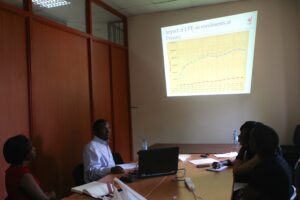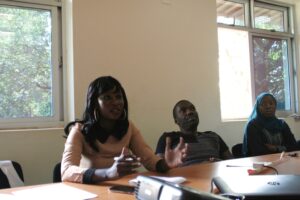Engaged Anthropology Grant: Brooke Bocast

Brooke Bocast is a Postdoctoral Fellow in Anthropology at the University of Maryland – College Park, specializing in the areas of gender, youth, and global health. In 2010, while a doctoral candidate at Temple University, she received a Dissertation Fieldwork Grant to aid research on “’If Books Fail, Try Beauty’: Gender, Consumption, and Higher Education in Uganda,” supervised by Dr. Jessica Winegar. In 2014, she was awarded the Engaged Anthropology Grant to return to her fieldsite in Uganda’s capital, Kampala, to publicly share and discuss her research findings on female university students’ strategies for social advancement in relation to higher education reform and rising rates of HIV on Ugandan university campuses.
It’s tough to be a university student in Kampala, Uganda. Students contend with crumbling facilities, ineffective administrations, campus closures due to faculty and student strikes, and social lives removed from rural kin networks. At Makerere University (the “Harvard of Africa”), students are saddled with expectations to succeed above and beyond their peers, a proposition made ever more difficult by decreasing opportunities for post-grad employment. While Makerere historically catered to the sons of the East African elite, in the 1990s, President Museveni privatized Uganda’s higher education sector and “democratized” Makerere admissions through quota systems. During my dissertation fieldwork (2010-2012), Makerere administrators and the general public debated the efficacy of these policies, with particular attention to affirmative action for women and the role of female students in general.
My dissertation research examined Makerere University’s sexual economy wherein university women exchange sexual favors for money, luxury commodities, and academic marks. These practices put young women at increased risk for STDs, pregnancy, and moral rebuke. Because of this, global health organizations often assume that women who participate in sexual economic transactions must be indigent, or ignorant, or both. Yet many university women engaged in “transactional” sex are members of Uganda’s nascent middle class and successful students at East Africa’s prestigious Makerere University. Based on data collected in Kampala and at students’ family homes throughout East Africa, I argue that participation in Makerere’s sexual economy is a central means by which female students pursue social advancement in a vastly transformed and contested education system. This strategy has profound consequences for kinship, marriage, and social structures, and gendered labor practices; in addition, campus-based relationships shape emerging HIV transmission patterns.

UNAIDS identifies transactional, “cross-generational” sex (locally termed “sugar daddy” relationships) as a key driver of Uganda’s rising HIV prevalence rates. In recent years, Uganda’s federal government, educational institutions, and public health NGOs have honed in on female university students’ role in these relationships via behavioral change campaigns that seek to alter students’ choice of sexual partners. [see image 1] Popular discourse assumes that young women pursue sugar daddy relationships because they are either vulnerable and desperate or materialistic and predatory. Throughout my fieldwork, university administrators and global health practitioners approached me with questions about young women’s motivations for engaging in sugar daddy relationships. I was often asked how to get university students to stop dating older men. Of course, there is no single “answer” to the “problem” of sugar daddy relationships. Young women engage in diverse sexual interactions for myriad affective, aspirational, and material reasons. My informants reject campaigns that position them as passive and vulnerable, because they consider themselves to be agentive and knowledgeable. At the same time, the epidemiological ramifications cannot be ignored. By engaging in unprotected sex with multiple partners across age brackets, young women put themselves and their partners at risk for STDs, and contribute to intergenerational HIV transmission.

I applied for an Engaged Anthropology Grant because I wanted to facilitate discussion between various stakeholders around the dynamics that drive intergenerational sexual relationships on campus. In order to avoid reproducing the dominant framing of transactional sex as a problem of young women lacking life skills and/or sexual restraint, I collaborated with my colleague, Dr. Christian Kakuba at Makerere’s Centre for Population and Applied Statistic (CPAS), to produce an event that framed students practices’ within an analysis of structural inequalities in Uganda’s education sector writ large. We titled our workshop, “Inequalities in Education: A Multi-disciplinary Perspective,” and included presentations based on demographic and ethnographic data that addressed access to, and experiences within, Uganda’s primary, secondary, and tertiary educational institutions. CPAS hosted the workshop, and attendees included Makerere students and alumni, university administrators, policy-makers, civil society actors, education professionals, and public health practitioners. Dr. Kakuba presented his findings on demographic factors that influence primary and secondary school attendance [see image 2], and I presented qualitative data on gendered health disparities among university students, in relation to HIV and cross-generational sex. In addition to paper presentations, we led break-out groups over lunch and facilitated discussions that tacked back and forth between students’ everyday experiences, national trends, and implications for policy and practice. [see image 3]

Workshop participants raised a number of points for further discussion. For example, a secondary school headmaster noted that current policies fail to account for the needs of students with physical and intellectual disabilities, rendering their educational experiences especially trying. Multiple participants, including Makerere alumni, questioned the value of formal education in general, given the limitations of Uganda’s formal employment sector. Female Makerere students spoke about the factors that compel young women to acquire sugar daddies, pointing out that affective and aspirational motivations often trump health concerns. [see image 4] A representative from the Institute for Social and Economic Rights requested further collaboration with the Centre for Population and Applied Statistics, given their shared institutional interests in population data and social justice. It is heartening to think that my Engaged Anthropology project provided a forum for such conversations to occur, and facilitated connections that may lead to improved services for students at all levels of Uganda’s education system.